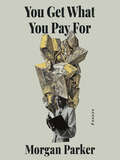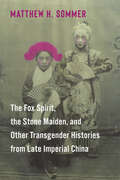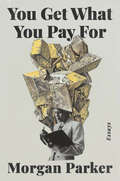Service Alert
Postal delivery
CELA has restarted production and distribution of embossed braille, printbraille and reloading of Envoy Connect devices. There may be delays in receiving your materials due to rotating strikes by Canada Post workers.
CELA has restarted production and distribution of embossed braille, printbraille and reloading of Envoy Connect devices. There may be delays in receiving your materials due to rotating strikes by Canada Post workers.
Showing 1 - 3 of 3 items

By Morgan Parker. 2024
In her “witty and searing” first essay collection, award-winning poet Morgan Parker examines “the cultural legacy of Black womanhood and…
the meaning of finding ‘well-being’ in a world that wasn’t built for you” ( Vogue ). Dubbed a voice of her generation, poet and writer Morgan Parker has spent much of her adulthood in therapy, trying to square the resonance of her writing with the alienation she feels in nearly every aspect of life, from her lifelong singleness to a battle with depression. She traces this loneliness to an inability to feel truly safe with others and a historic hyperawareness stemming from the effects of slavery. In a collection of essays as intimate as being in the room with Parker and her therapist, Parker examines America’s cultural history and relationship to Black Americans through the ages. She touches on such topics as the ubiquity of beauty standards that exclude Black women, the implications of Bill Cosby’s fall from grace in a culture predicated on acceptance through respectability, and the pitfalls of visibility as seen through the mischaracterizations of Serena Williams as alternately iconic and too ambitious. With piercing wit and incisive observations, You Get What You Pay For is ultimately a portal into a deeper examination of racial consciousness and its effects on mental well-being in America today. Weaving unflinching criticism with intimate anecdotes, this devastating memoir-in-essays paints a portrait of one Black woman’s psyche—and of the writer’s search to both tell the truth and deconstruct it
By Matthew H. Sommer. 2024
In imperial China, people moved away from the gender they were assigned at birth in different ways and for many…
reasons. Eunuchs, boy actresses, and clergy left behind normative gender roles defined by family and procreation. “Stone maidens”—women deemed physically incapable of vaginal intercourse—might depart from families or marriages to become Buddhist or Daoist nuns. Anatomical males who presented as women sometimes took a conventionally female occupation such as midwife, faith healer, or even medium to a fox spirit. Yet they were often punished harshly for the crime of “masquerading in women’s attire,” suspected of sexual predation, even when they had lived peacefully in their communities for many years.Exploring these histories and many more, this book is a groundbreaking study of transgender lives and practices in late imperial China. Through close readings of court cases, as well as Ming and Qing fiction and nineteenth-century newspaper accounts, Matthew H. Sommer examines the social, legal, and cultural histories of gender crossing. He considers a range of transgender experiences, illuminating how certain forms of gender transgression were sanctioned in particular social contexts and penalized in others. Sommer scrutinizes the ways Qing legal authorities and literati writers represented and understood gender-nonconforming people and practices, contrasting official ideology with popular mentalities. An unprecedented account of China’s transgender histories, this book also sheds new light on a range of themes in Ming and Qing law, religion, medicine, literature, and culture.
By Morgan Parker. 2024
The award-winning author of Magical Negro traces the difficulty and beauty of existing as a Black woman through American history,…
from the foundational trauma of the slave trade all the way up to Serena Williams and the aftermath of Hurricane Katrina&“An engrossing journey through Parker&’s expansive and gifted mind.&”—Clint Smith, author of How the Word Is PassedDubbed a voice of her generation, poet and writer Morgan Parker has spent much of her adulthood in therapy, trying to square the resonance of her writing with the alienation she feels in nearly every aspect of life, from her lifelong singleness to a battle with depression. She traces this loneliness to an inability to feel truly safe with others and a historic hyperawareness stemming from the effects of slavery.In a collection of essays as intimate as being in the room with Parker and her therapist, Parker examines America&’s cultural history and relationship to Black Americans through the ages. She touches on such topics as the ubiquity of beauty standards that exclude Black women, the implications of Bill Cosby&’s fall from grace in a culture predicated on acceptance through respectability, and the pitfalls of visibility as seen through the mischaracterizations of Serena Williams as alternately iconic and too ambitious.With piercing wit and incisive observations, You Get What You Pay For is ultimately a portal into a deeper examination of racial consciousness and its effects on mental well-being in America today. Weaving unflinching criticism with intimate anecdotes, this devastating memoir-in-essays paints a portrait of one Black woman&’s psyche—and of the writer&’s search to both tell the truth and deconstruct it.